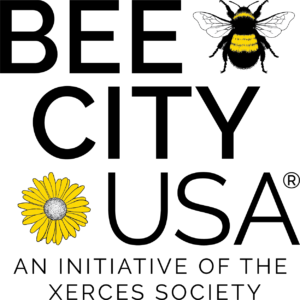Photo: Sara Morris
ABOUT Bee City usa & Bee Campus USa
When people hear the word “bee” they often think of a single bee species, the European honey bee (Apis mellifera). However, the United States is also home to just over 3,600 native (wild) bee species such as bumble bees, leafcutter bees, sweat bees, mason bees, longhorn bees, and mining bees. Native pollinators are particularly important because they evolved alongside native plants and in many cases are the most effective pollinators — and in a few cases, the only pollinators. Pollinators are keystone species in essentially every terrestrial ecosystem on earth, assisting in plant reproduction and supporting other species of wildlife. Pollinators touch our lives in numerous ways each day, including being responsible for approximately one third of the food and drink we consume. The value of crop pollination has been estimated between $18 and $27 billion annually in the U.S.
Research has shown significant declines in native pollinator population sizes and ranges globally. In fact, up to 40% of pollinator species on earth may be at risk of extinction in the coming years as a result of habitat loss, pesticide use, and climate change.
Thinking globally and acting locally, Bee City USA provides a framework for communities to come together to conserve native pollinators by providing them with healthy habitat that is rich in a variety of native plants, provides nest sites, and is protected from pesticides. As the name suggests, the focus of Bee City USA is bees, and primarily our native species. The steps that affiliates take to conserve our native bees, including creating safe habitats and hosting community events, will also help other pollinators including butterflies and moths as well as the non-native honey bee. One of the most impactful actions any affiliate can take is to encourage others to think beyond the honey bee and recognize the true diversity of bees that sustain our communities.
Joining the cities and campuses across the country rallying to protect pollinators is a great way to bring your community together to create positive change.
Bee City USA and Bee Campus USA are initiatives of the Xerces Society for Invertebrate Conservation.
Bee City USA® and Bee Campus USA work to galvanize communities to sustain pollinators, in particular the more than 3,600 species of native bees in this country, by increasing the abundance of native plants, providing nest sites, and reducing the use of pesticides. Bee City USA and Bee Campus USA are initiatives of the Xerces Society for Invertebrate Conservation.
our history
Bee City USA began in Asheville, North Carolina in 2012 when founder, Phyllis Stiles, threw herself into creating a program to help communities come together to help reverse pollinator declines. Phyllis’ goal was to engage as many communities as possible in pollinator conservation. What she lacked in funding she made up for in passion, enthusiastically giving presentations and spreading awareness about pollinators and the program she had started to help them. In 2014 Bee City USA gained it’s second affiliate when Talent, Oregon applied.
Since then Bee City USA has spread across the country and continues to grow as more communities learn about pollinator declines and become energized to participate in conserving these essential species. In 2015 Bee City USA expanded to college and university campuses, launching the sister initiative, Bee Campus USA. As the programs grew, Phyllis sought a home for Bee City USA and Bee Campus USA that could support them and continue to expand their reach and impact.
In 2018 Bee City USA and Bee Campus USA became initiatives of the Xerces Society for Invertebrate Conservation. Established in 1971, the Xerces Society is at the forefront of invertebrate protection, harnessing the knowledge of scientists and enthusiasm of citizens to implement conservation programs worldwide. Bee City USA and Bee Campus USA align with Xerces’ strategy of using advocacy, education, and applied research to promote invertebrate conservation.




